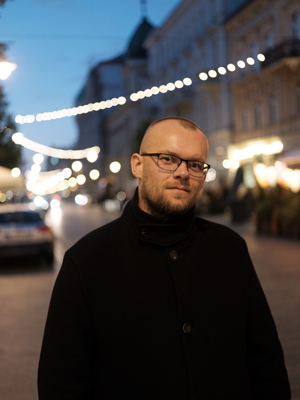"Poland is the ideal country for career changers"
Tobias Steinert moved to Poland in 2021 for work. In the interview, the 32-year-old discusses why Poland is a great country to find jobs, whether you're an experienced professional or someone wanting to switch careers.
You were born in Rhineland-Palatinate and you lived in Nuremberg for a long time. Why did you choose to emigrate to Poland in 2021?
Steinert: I've always found Eastern European countries fascinating, mainly because of the people and the beautiful nature. I visited Bulgaria for vacations in 2014 and 2015, and even back then, I thought about the idea of moving there. When I was searching for job opportunities, Poland caught my attention. It's a neighboring country to Germany and close to other Eastern European countries I enjoy exploring. There were many job offers in fields like sales, marketing, e-commerce, and copywriting. In July 2021, I took the leap and settled in Poland. It was a big adventure for me since I had never been to that country before.
Initially, I worked for a German company in Warsaw, then I relocated to Lodz. For the past eight months, I've been living and working in Krakow.
"I feel very comfortable in Poland."
I feel very comfortable here. There are many students living in this city, it is international, it has a long history and a rich culture… And it's also a bit quieter than in Warsaw, even though it gets much more crowded here from spring onwards because of the tourism. Nevertheless, I really appreciate the pleasant atmosphere of this city.
I had a family connection to Poland because my grandmother was born in Masuria. My impression of polish people is that for them, family is more important. The community matters more than the individual. And there is more solidarity than division.
What do you do for a living and what does the labour market in Poland look like for foreign professionals?
Steinert: Currently, I work as a Google Ads account manager. However, I will soon start a new job as an advertising copywriter for a Polish company. Additionally, I'm also establishing my own business, Tobias Steinert Copywriting Expert, where I offer writing services for individuals and businesses. This includes creating content for social media, email marketing, blogs, and web pages.
Poland has become a significant market for Germany, and there is a shortage of skilled workers in the country.
About ten years ago, youth unemployment was high, but since 2010, more foreign companies have entered Poland, creating numerous job opportunities. By 2025, Poland's population is expected to decrease to 30 million, so companies are hiring skilled workers from other countries. Poland is particularly attractive for German-speaking professionals, as well as those fluent in Dutch, Scandinavian languages, Spanish, and French. People who can speak these languages fluently can enjoy higher salaries.
In Germany, the job market for young professionals may not be as appealing. Often, there are initially fixed-term contracts, and remote work is not widely accepted compared to Poland.
 Krakow, Poland © Elena Petrova,AdobeStock
Krakow, Poland © Elena Petrova,AdobeStock
In your opinion, what makes the Polish labour market attractive?
Steinert: In Poland, it is less important for employers that you have the right references, the right certificates or that your resume has clear and consistent narrative that it is for German employers. It’s more suited for people who like to change careers.
The main criterion when choosing employees is often the German language. In fact, a so-called "language bonus" is paid here: being fluent in German can get you up to 2,000 zloty (just under 500 euros) more earnings. I can't confirm the myth that you have to know Polish either. Solid English skills are much more important than Polish skills. English is the language of internal communication in most international companies anyway.
"There are no tax brackets in Poland."
And if you are good at your job, your salary also increases relatively quickly. Since I arrived in the summer of 2021, I have doubled my salary. That's 100 per cent in just 2 years through 3 job changes!
In addition, the taxes and social security contributions on the income are relatively low. If you have a permanent job, you pay a maximum of 31 per cent. If you negotiate a B2B contract, i.e. a freelance contract, you only pay eight to 19 percent tax, depending on the model. Incidentally, there are no tax brackets as in Germany.
For foreign employees, many companies also pay a relocation or welcome bonus, i.e. a one-off payment just for taking up a job. In addition, many companies offer mobile working or 100 per cent home office. And I often see that there are attractive employee benefits such as use of all fitness studios or private health insurance in Poland.
 Tobias Steinert
Tobias Steinert
How would you describe the Polish mentality - in contrast to the German one? What do you appreciate about the mindset of people in Poland?
Steinert: I perceive the Poles as tending to be pessimistic, but it is more a kind of pessimism of purpose, as they always end up finding a solution. For example, at work I notice that some Polish colleagues first say that deadlines are not realistic and then it works out in the end.
To me, the people here seem very disciplined, but also a bit more spontaneous than the Germans. Maybe they are also a bit more chaotic than we are, but they are really well organised. For example, projects are not as structured as I have experienced in German companies. The approach may seem a bit more disorganised, but the result is no less good because of that. In general, I also notice that performance counts more here than other characteristics such as age.
What also surprised me is that the religious influence in everyday life is not as strong as I would have thought - at least in cities. I had expected to see more of the Catholic character of the people.
Otherwise, I find the people here to be emotional, family-oriented and very hospitable. This mix of mentalities suits me. I like it a lot. My circle of friends is very international and consists of Polish friends as well as newcomers from other countries. Nevertheless, it is my wish to integrate myself even more into Polish society and I would like to learn a lot more about the country and travel around it.
When you tell people that you emigrated to Poland, how do they usually react? Are there any prejudices?
Steinert: Mostly I get loud silence as a reaction. Often the first reaction is astonishment, because Poland is not yet the classic emigration country. Yet 8,000 Germans emigrate to Poland every year.
"The people here are very family-oriented and hospitable."
You know, I could have also moved to Greece, as I had been offered a very lucrative job in Thessaloniki in June 2021. But for me, nice weather isn't everything and moving to a country for the long term is not the same experience as to visit this country for a few days during a holiday.
That's one reason why I founded my blog auswandern-polen.de. I wanted to clear up some prejudices. I wanted to dispel myths and clichés and show that Poland is an attractive and interesting country. When I was planning my own emigration, I found very little information about living and working in Poland - and if I did, it was outdated or wrong data.
"Poland is no longer a low-wage country."
Poland has not been a low-wage country for a long time. And the cost of living has also not been that low for quite some time. For example, I myself pay 600 euros rent for an 18-square-metre luxury apartment in the centre of Krakow.
With my blog, I also want to spread insider knowledge, for example about the earning opportunities here. Through social media, I'm finding that the topic is becoming more and more popular. I was even invited to Polski Radio in Warsaw to talk about my emigration.
Is Germany still an attractive country of residence for Poles at all?
Steinert: There are definitely still many Poles who want to come to Germany. This mainly concerns doctors, nursing staff and craftsmen. These fields are still quite underfunded in Poland and do not offer high income opportunities.
This will probably change, because a lot has happened since Poland joined the Schengen area in 2007 and has benefited from EU funding, among other things. These measures have attracted countless investors and the development continues.
To which people or groups of people would you recommend going to Poland and why?
Steinert: Poland is very suitable for career changers. The cliché that you can only find work abroad with high-paying jobs is still alive, but that is not true here. People who are motivated can quickly find a job, but professionals who want to take the next step can also make good progress here. It is strongly rewarded by companies in this country when Germans go to Poland for a job.
I also notice that there is hardly any age discrimination here. People over 50, for example, are very welcome here. I had a colleague at my first employer who was in his mid-50s and moved up the career ladder quite quickly. His experience was rewarded, and he was offered a team management position after a relatively short time. In general, I find Poland to be an employee-friendly country.
What about the health care system in Poland? How good is the care?
Steinert: The state health system is still severely underfunded, but through the National Health Fund, everyone in Poland is entitled to free treatment in clinics and licensed medical practices.
Many employers offer private health insurance that allows people to be treated in private clinics. Unlike in Germany, anyone can take out private health insurance; insurability is not tied to an income limit.
Can you imagine staying in Poland forever or are you planning to return to Germany in the foreseeable future?
Steinert: I don't plan to return to Germany in the next few years. I would like to spend at least two more years in Poland. After that, I can imagine moving to south-eastern Europe. Maybe even Bulgaria. But the post-Soviet space is also very interesting for me because of my Russian language skills and life experience.
But the world is turning so fast, so it's hard for me to predict my personal future or my future place of residence. However, I am always open to interesting business contacts. If you are interested, please feel free to contact me!

